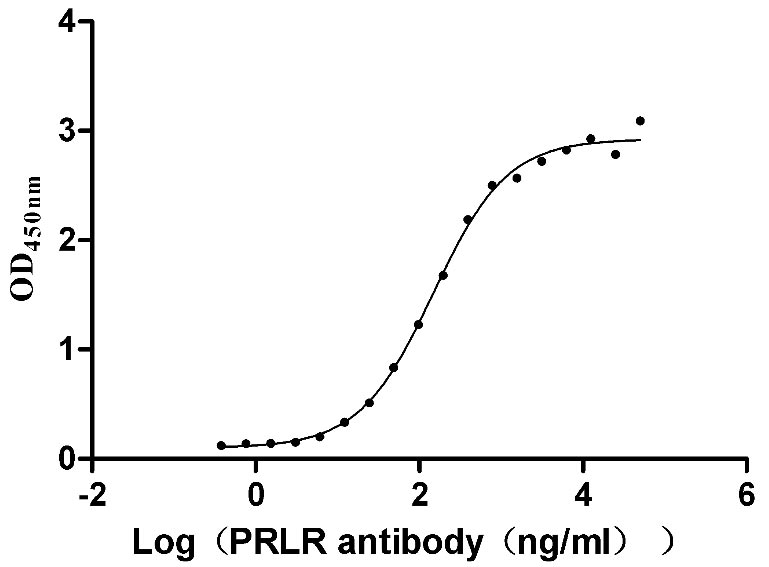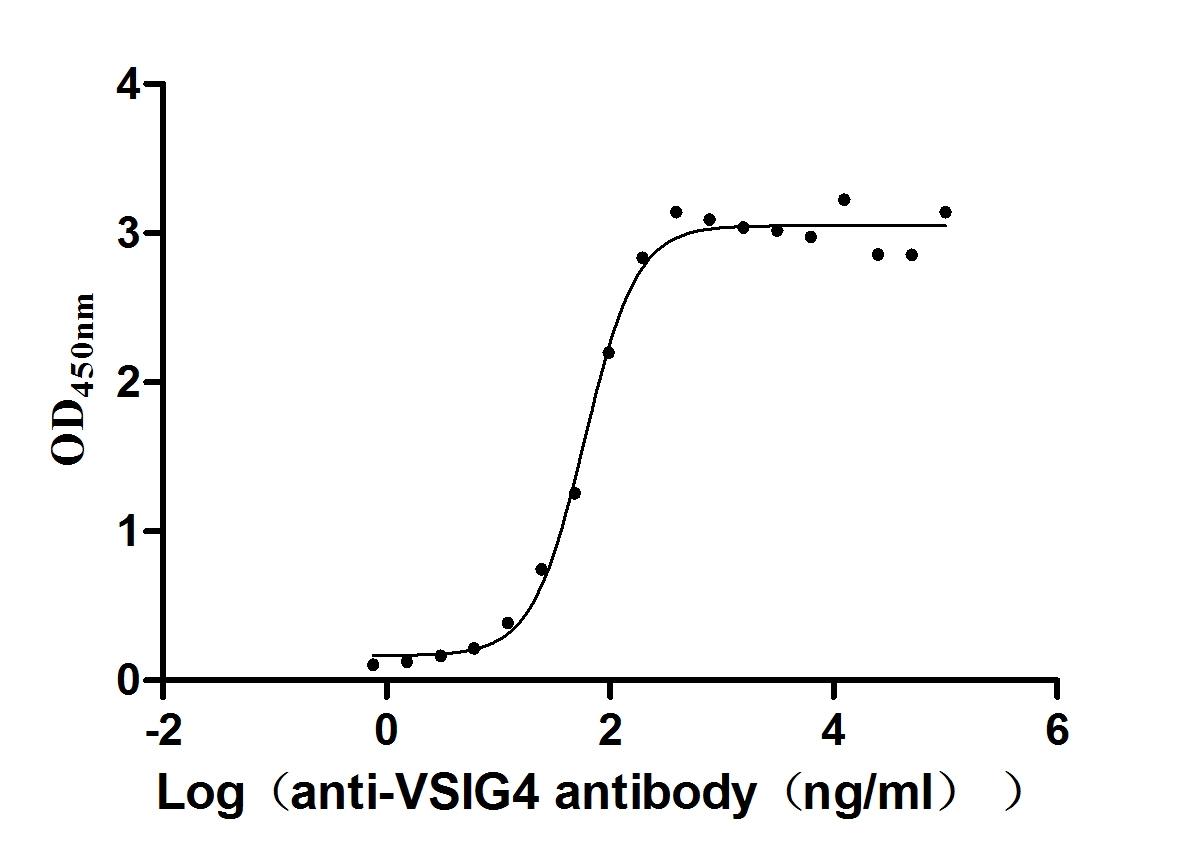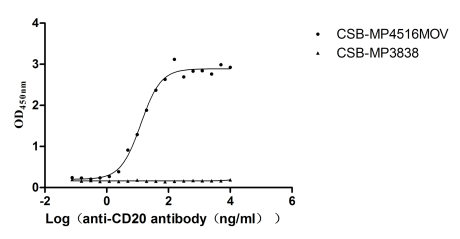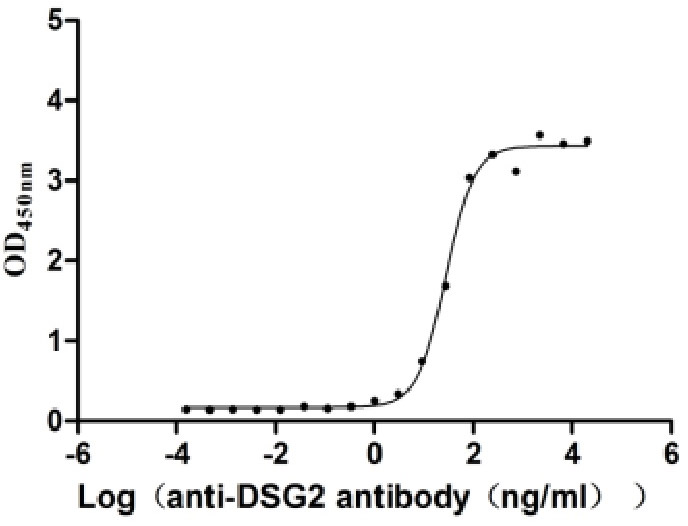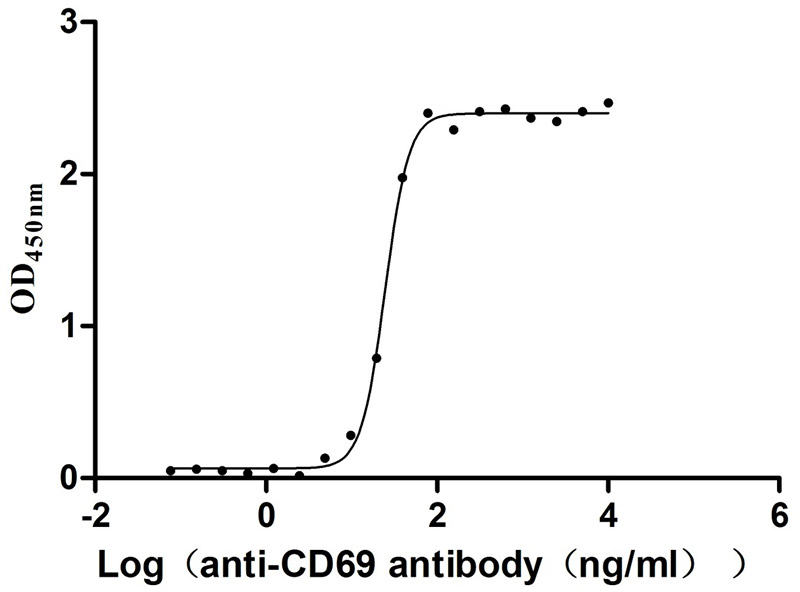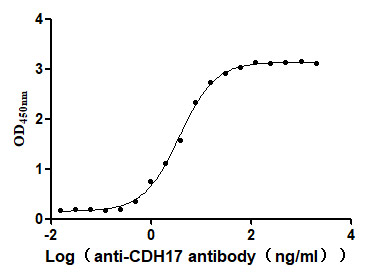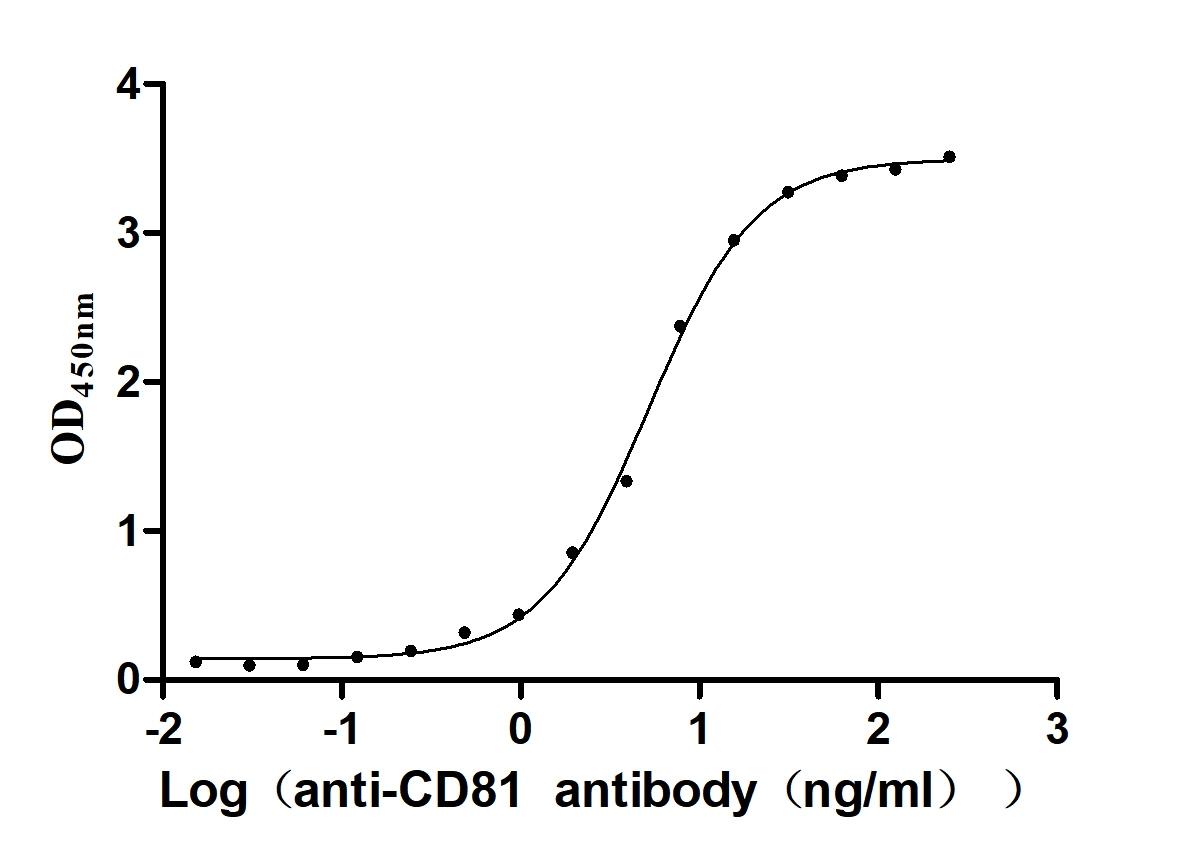Recombinant Human Serum amyloid A-1 protein (SAA1)
产品详情
-
纯度:>98% as determined by SDS-PAGE.
-
内毒素:Less than 1.0 EU/μg as determined by LAL method.
-
生物活性:Fully biologically active when compared to standard. The biological activity determined by a chemoattract bioassay using human monocytes is in a concentration range of 10-100 ng/ml.
-
基因名:SAA1
-
Uniprot No.:
-
别名:SAA1; Serum amyloid A-1 protein; SAA) [Cleaved into: Amyloid protein A; Amyloid fibril protein AA); Serum amyloid protein A(2-104); Serum amyloid protein A(3-104); Serum amyloid protein A(2-103); Serum amyloid protein A(2-102); Serum amyloid protein A(4-101)]
-
种属:Homo sapiens (Human)
-
蛋白长度:Full Length of Mature Protein
-
来源:E.Coli
-
分子量:11.7 kDa
-
表达区域:19-122aa
-
氨基酸序列RSFFSFLGEA FDGARDMWRA YSDMREANYI GSDKYFHARG NYDAAKRGPG GVWAAEAISD ARENIQRFFG HGAEDSLADQ AANEWGRSGK DPNHFRPAGL PEKY
-
蛋白标签:Tag-Free
-
产品提供形式:Liquid or Lyophilized powder
Note: We will preferentially ship the format that we have in stock, however, if you have any special requirement for the format, please remark your requirement when placing the order, we will prepare according to your demand. -
缓冲液:0.2 μm filtered concentrated solution in 20 mM Tris-HCl, pH 9.0, 150 mM NaCl,Lyophilized
-
储存条件:Store at -20°C/-80°C upon receipt, aliquoting is necessary for mutiple use. Avoid repeated freeze-thaw cycles.
-
保质期:The shelf life is related to many factors, storage state, buffer ingredients, storage temperature and the stability of the protein itself.
Generally, the shelf life of liquid form is 6 months at -20°C/-80°C. The shelf life of lyophilized form is 12 months at -20°C/-80°C. -
货期:Basically, we can dispatch the products out in 1-3 working days after receiving your orders. Delivery time may differ from different purchasing way or location, please kindly consult your local distributors for specific delivery time.Note: All of our proteins are default shipped with normal blue ice packs, if you request to ship with dry ice, please communicate with us in advance and extra fees will be charged.
-
Datasheet & COA:Please contact us to get it.
相关产品
靶点详情
-
功能:Major acute phase protein.
-
基因功能参考文献:
- SAA1 can be produced in human fetal membranes, which can be greatly induced in the presence of proinflammatory cytokines and glucocorticoids thereby producing effects associated with parturition PMID: 28386088
- High SAA1 expression in the stromal component is associated with pancreatic tumors. PMID: 29351990
- Data suggest that anti-inflammatory capacity of HDL (high-density lipoprotein) from patients with type 2 diabetes and diabetic nephropathy is impaired; this effect might be attributable to SAA enrichment in HDL in these patients; up-regulation of SAA in HDL appears to be associated with increased risk of diabetic angiopathy or vasculitis in such patients. PMID: 28760652
- The frequencies of the CC genotype and the C allele of SAA rs12218 were higher in participants with ischemic stroke than in the control group. The frequencies of the AG genotype and the G allele of rs2468844 were higher in participants with ischemic stroke than in the control group. Multiple logistic regression analysis revealed the significance of the rs12218 in males and in large-artery atherosclerosis group. PMID: 28870546
- we show that astrocytoma patients have increased levels of serum SAA and SAA1 is expressed and secreted in glioblastoma, and its co-expression with tumor-related genes supports its involvement in glioblastoma angiogenesis and progression. PMID: 28283801
- These results suggested that the C-terminal truncation of human SAA accelerates amyloid fibril formation. PMID: 29288051
- SAA1 can be a potential mediator for UV-induced MMP-1 expression in human skin. PMID: 26900010
- Data suggest that serum amyloid A (SAA) immunoreactivity in tumor-associated macrophage (TAM) is associated with worse recurrence-free survival, and is perhaps a therapeutic target for breast cancer. PMID: 27058895
- Findings indicate that in Lyme disease patients, circulating CRP and SAA (Serum Amyloid A) levels are highest when the concentration of spirochetes is greatest in skin and/or blood and that levels decline after the dissemination of the organism to extracutaneous sites in subsequent stages of infection. PMID: 27585799
- The Serum amyloid A (SAA)/formyl peptide receptor-like 1 (FPRL1) contributed to pathogenesis of psoriasis by promoting keratinocyte proliferation and inflammation, thus providing a potential therapeutic target for disease therapy. PMID: 27910163
- High SAA expression is associated with lung cancer. PMID: 27809798
- SAA, PROZ, and C4BPB may serve as new potential biomarkers for TB PMID: 28278182
- Novel truncated form of serum amyloid A is elevated in the plasma of Kawasaki disease (KD) when compared with Febrile control subjects. Future studies will evaluate its relevance as a diagnostic biomarker and its potential role in the pathophysiology of KD. PMID: 27271757
- SR-A1 suppresses lung cancer metastasis by downregulating SAA1 production in tumor-associated macrophages (TAM). PMID: 28202524
- The SAA1.1 allele was found in four familial Mediterranean fever patients, including two with AA amyloidosis. PMID: 27150194
- genetic variants at the CRP and SAA1 loci independently affect both CRP and SAA levels, and their respective circulating levels act as suppressors. PMID: 27313400
- Serum amyloid A could represent a novel marker of primary unexplained recurrent early pregnancy loss because affected women exhibited elevated levels of this protein. PMID: 28099717
- The polymorphism of SAA1 is not associated with susceptibility and severity of Familial Mediterranean Fever in Egyptian children PMID: 27300189
- The findings identify SR-BII as a functional SAA receptor that mediates SAA uptake and contributes to its proinflammatory signaling via the MAPK-mediated signaling pathways. PMID: 28423002
- Correlate MEFV genotype and the SAA1 polymorphisms with the clinical manifestations of familial Mediterranean fever and the occurrence of amyloidosis in a large cohort of Armenian patients. PMID: 27791951
- Study found increased SAA concentration in patients with sarcoidosis. PMID: 26919159
- the detection of residues 76 and 77 of SAA (AA76) may alter the ability to diagnose AA amyloidosis. PMID: 27098620
- The results demonstrated that SAA upregulated Visfatin expression in cultured RAW264.7 macrophages and in the primary monocytes. PMID: 27006946
- Structure, function and SAA1 gene polymorphisms PMID: 26945629
- Serum Amyloid A induces inflammation, proliferation and cell death in activated hepatic stellate cells. PMID: 26937641
- Amyloid A overexpressed in renal cell carcinoma patients and can serve as a prognostic marker. PMID: 26750935
- incorporation of SAA into HDL preparations reduced antiinflammatory properties but not to the same extent as HDL from AgNO3-injected mice PMID: 26642365
- human SAA is possibly only expressed in a subset of septic patients; SAA induces HMGB1 release via TLR4 and RAGE receptors; SAA supplementation worsens the outcome of lethal endotoxemia PMID: 26052716
- The SAA1 rs12218 polymorphism was significantly more prevalent in ankylosing spondylitis patients with amyloidosis. PMID: 26300108
- Autocrine/paracrine and recombinant human SAA1 via TLR4 stimulate a proinflammatory phenotype that is both part of the early phase of osteogenic differentiation and the development of senescence. PMID: 26135899
- Serum amyloid A1alpha induces paracrine IL-8/CXCL8 via TLR2 and directly synergizes with this chemokine via CXCR2 and formyl peptide receptor 2 to recruit neutrophils. PMID: 26297794
- These functional properties set SAA apart from well-characterized inflammatory factors, such as LPS and TNF-alpha, suggesting that it may play a homeostatic role during the course of inflammation. PMID: 26130702
- The detailed analysis of the docking results points to the fact that the best serum amyloid A-Cystatin C (SAA-hCC) binding is achieved by the peptides inclined toward interacting via Lys90 and Arg 96 (with ffhCC Ser98 and Tyr102, respectively). PMID: 25736604
- Our results showed PCT as a valuable marker of bacterial infections in febrile patients. PCT was superior to CRP, IL-6 or SAA in the early identification of bacterial infection PMID: 25963492
- Mutations in genetic biomarker SAA1 gene related to amyloidosis processes may play a crucial role in chronic renal failure patients who require long-term hemodialysis. PMID: 25394530
- The relative abundance of the N-terminal arginine truncation of SAA1.1 is significantly decreased in diabetes and negatively correlates with measures of glycemic and lipid control. PMID: 25607823
- potential marker for detecting the activity of srcoidosis PMID: 25623898
- Genetic polymorphisms in SAA1 are associated with coronary artery disease in the Han and Uygur populations in Western China. PMID: 25656165
- High SAA serum level is associated with hepatocellular carcinoma. PMID: 25605163
- HDL3 subpopulations in ST segment elevation myocardial infarction were enriched 10 times in SAA patients. PMID: 26037829
- SAA has a role in activity of rheumatoid arthritis and risk of cardiovascular and renal involvement PMID: 25525305
- SR-B1 and p38 MAPK are involved in signaling pathway of serum amyloid A-induced angiogenesis in rheumatoid arthritis. PMID: 25932604
- Although SAA concentrations were elevated in the sera, there was no significant difference in these concentrations between familial Mediterranean fever patients and rheumatoid arthritis patients. PMID: 25240611
- Zn deficiency enhances the acute phase response and particularly the JAK-STAT3 pathway, resulting in increased serum amyloid A production. PMID: 24732911
- Serum amyloid A is a retinol binding protein that transports retinol during bacterial infection. PMID: 25073702
- Data suggest that serum amyloid A (SAA) is a candidate for diabetic kidney disease therapeutic and biomarker discovery. PMID: 25531567
- The CSF biomarker amyloid 1-42 is important and useful as part of the diagnostic procedure for detecting AD and other dementia in elderly patients displaying psychotic symptoms. PMID: 23597931
- homozygous SAA1.5/1.5 genotype appears to be a recessive susceptibility gene, which has lost the antiangiogenic function, whereas SAA1.1 and SAA1.3 are the dominant alleles of the tumor suppressor phenotype. PMID: 24608426
- keratinocyte-derived SAA triggers a key inflammatory mediator, IL-1beta, via NLRP3 inflammasome activation, providing new potential targets for the treatment of this chronic skin disease. PMID: 25231464
- SAA1 gene expression in COPD patients is responsible for the secretion of this molecule in different cell types. PMID: 24884805
显示更多
收起更多
-
相关疾病:Reactive, secondary amyloidosis is characterized by the extracellular accumulation in various tissues of the SAA1 protein. These deposits are highly insoluble and resistant to proteolysis; they disrupt tissue structure and compromise function.
-
亚细胞定位:Secreted.
-
蛋白家族:SAA family
-
组织特异性:Expressed by the liver; secreted in plasma (at protein level).
-
数据库链接:
HGNC: 10513
OMIM: 104750
KEGG: hsa:6288
STRING: 9606.ENSP00000348918
UniGene: Hs.632144
Most popular with customers
-
Recombinant Human Pro-neuregulin-1, membrane-bound isoform (NRG1), partial (Active)
Express system: Mammalian cell
Species: Homo sapiens (Human)
-
Recombinant Human Prolactin receptor (PRLR), partial (Active)
Express system: Mammalian cell
Species: Homo sapiens (Human)
-
Recombinant Human V-set and immunoglobulin domain-containing protein 4 (VSIG4), partial (Active)
Express system: Mammalian cell
Species: Homo sapiens (Human)
-
Recombinant Macaca fascicularis Membrane spanning 4-domains A1 (MS4A1)-VLPs (Active)
Express system: Mammalian cell
Species: Macaca fascicularis (Crab-eating macaque) (Cynomolgus monkey)
-
Recombinant Human Desmoglein-2 (DSG2), partial (Active)
Express system: Mammalian cell
Species: Homo sapiens (Human)
-
Recombinant Human Early activation antigen CD69 (CD69), partial (Active)
Express system: Mammalian cell
Species: Homo sapiens (Human)
-
Recombinant Human Cadherin-17 (CDH17), partial (Active)
Express system: Mammalian cell
Species: Homo sapiens (Human)
-
Recombinant Human CD81 antigen (CD81), partial (Active)
Express system: Mammalian cell
Species: Homo sapiens (Human)

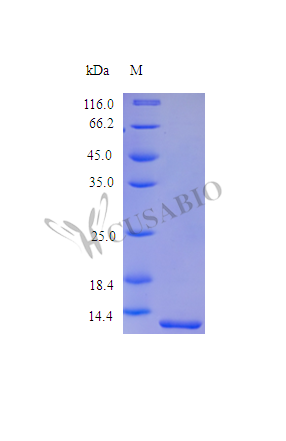

-AC1.jpg)
